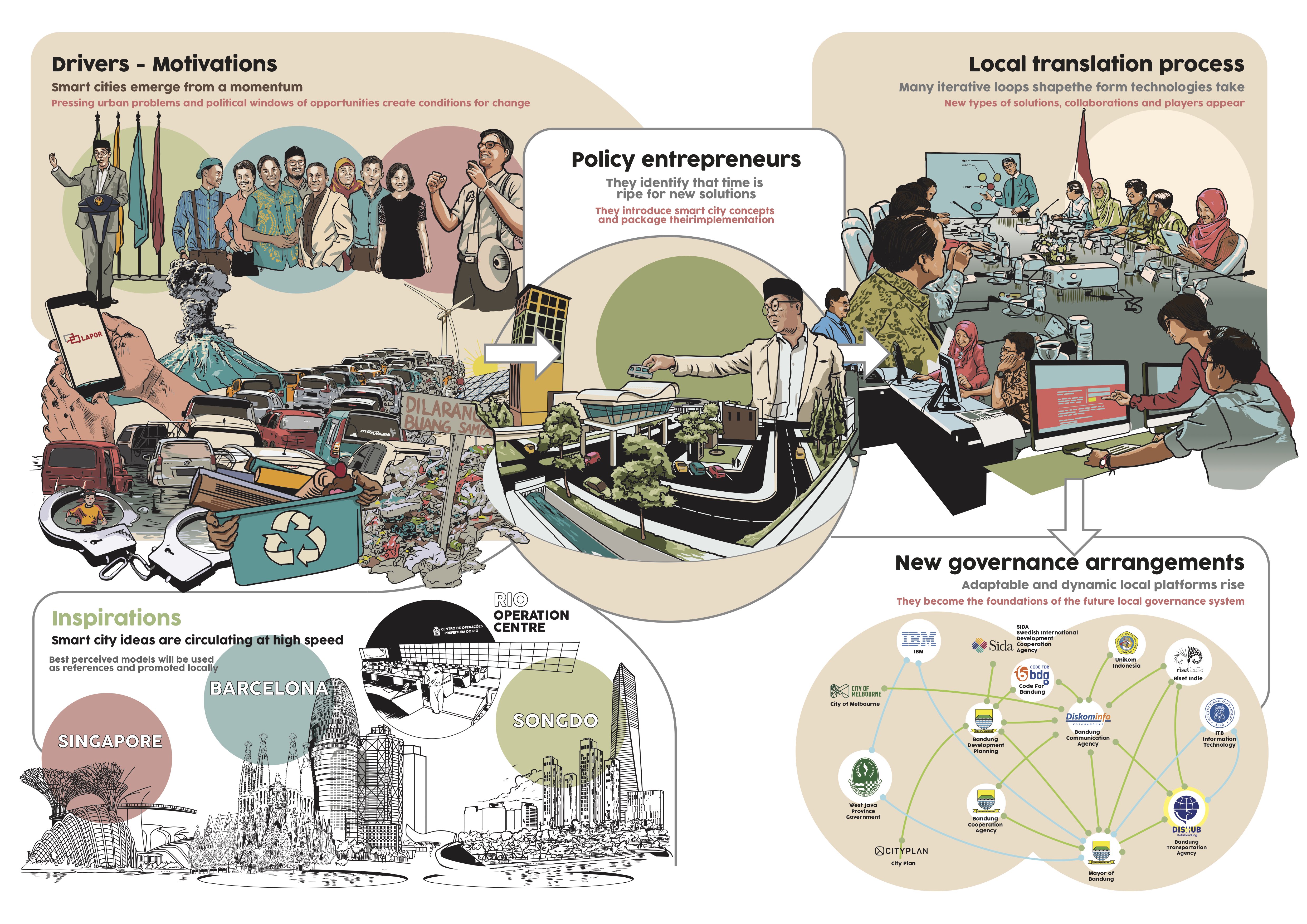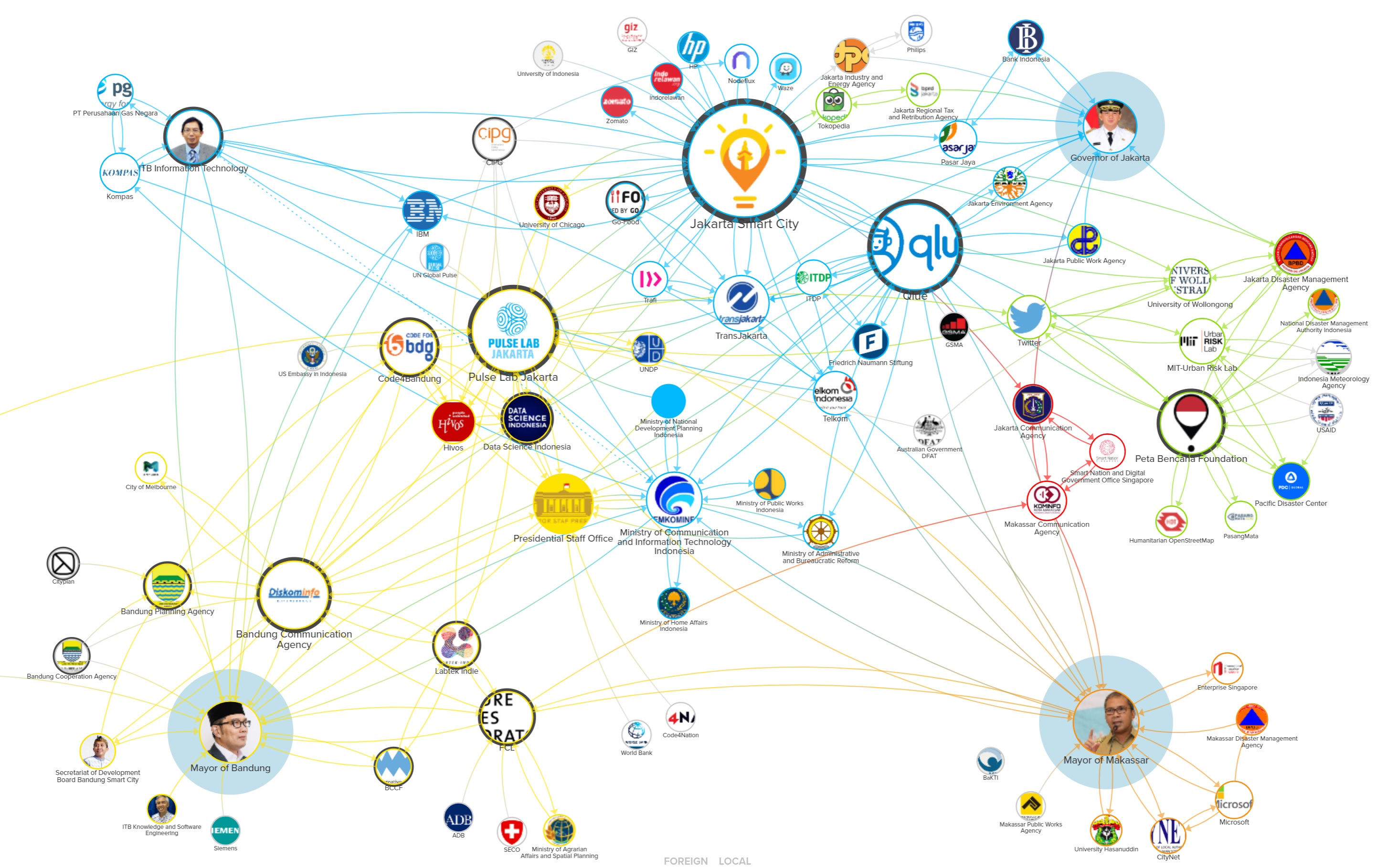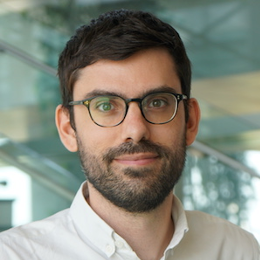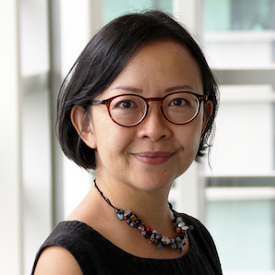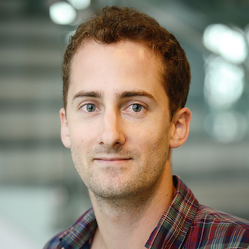Bandung, the third biggest city in Indonesia, has been at the forefront of the smart city movement in Southeast Asia, praised by its peers both domestically and internationally. Indonesia is pushing forward smart city solutions and has kicked off an ambitious digitalisation programme in 2017: “Gerakan 100 Smart Cities” or “100 Smart Cities”. In parallel, Singapore, a prime mover and role model in the region, launched the ASEAN Smart City Network in 2018 during its chairmanship of the organisation. The network aims to foster the exchange of solutions and best practices between cities engaged in smart city projects.
As smart city ideas and solutions spread out in Southeast Asia, we propose to unpack the critical dimensions behind a successful smart city process (5 lessons), taking the example of Bandung Smart City.
Credits: Yoshi Andrian Amtha (copyright: Future Cities Laboratory, 2020)
- At the right time with the right agenda: Smart cities take off during specific time windows. In the case of Bandung, turbulent political times; the trial of the incumbent mayor, pushed for a new political leadership. During the 2013 municipal elections, Ridwan Kamil, a civil society candidate, managed to capture the city’s pressing problems such as urban mobility and to build momentum around his new vision for the city. This vision was based on a boost in transparency and efficiency of public services and an exploration of smart city solutions. Balancing political motivation with a real drive to solve actual city problems is key.
- Draw on existing solutions and connect to international networks: Smart city ideas and solutions are travelling at high speed and international city networks provide venues for learning and cooperation. In Bandung, inspirations were drawn both from IT-heavy infrastructures such as the Rio Operations Centre and from citizen-centric approaches that can be found in Europe. Bandung has also been an active member of the creative cities movement, through the Bandung Creative City Forum, which gave the city an exposure to creative and bottom-up smart city solutions, based on citizen empowerment.
- Identify your policy entrepreneurs and develop a smart city blueprint: Smart cities don’t take off without the action of local leaders - policy entrepreneurs - who develop a vision and a plan on how to leverage technology and guide smart city development in the long run. In the case of Bandung, the former mayor, Ridwan Kamil acted as the main translator of the smart city solutions that were adopted locally. He leveraged his international network of partners, re-organized the municipal services and re-branded Bandung as a poster child for smart cities in Indonesia.
- Engage with local partners and work on the translation of your smart city: Solutions that have been borrowed from abroad must be tweaked, mixed with local solutions, altered, repurposed. In the case of Bandung, the creation of a Smart City council helped to lay down a local strategy in regards to technology adoption. Internationally-benchmarked solutions were adapted to the local context. The command centre model was modified, making it more public-facing and less “black-boxy”, and local digital solutions giving citizens a voice were adopted, such as Lapor!, one of Indonesia’s first online feedback programmes (soon followed by Qlue).
- Develop conducive governance arrangements: Through the translation process, new governance arrangements emerge and change the local urban governance system. These new settings usually involve multiple stakeholders, policies (e.g. open data), new tools and technologies. The arrangement around the Bandung Command Centre helped break silos between the different government agencies and created opportunities for researchers and start-ups to plug in new solutions. Ultimately, this has encouraged the municipality to increase data sharing between agencies and further strengthen digital literacy among civil officers.
Mapping of three Indonesian smart cities and their main stakeholders and connections (2010-2019), using Kumu software (Future Cities Laboratory, 2019)
In conclusion, this article argues that smart cities are not simple end-to-end technology adoption projects but are embedded in the local policy processes. Local leaders play a central role in smart city development and guide the translation of international solutions to the local contexts. Many cities in Southeast Asia are eager to embark on digitalisation and urban transformation and it is vital to support them in the understanding of the opportunities and the pitfalls of smart city projects. We hope, through the identification and the articulation of these 5 lessons, to shed some light on the challenges of smart city development in Southeast Asia and inform the future decisions of local urban leaders and technology producers.
This article leverages the methodology and the findings of the research project “Translating Smart Cities and Urban Governance in ASEAN” led by the Future Cities Laboratory (FCL) - Singapore ETH Centre and the NUS-Lee Kuan Yew School of Public Policy (2019-2020), focusing on the development of three smart cities in Indonesia: Bandung, Jakarta and Makassar.
Author: Fabien Clavier
Fabien Clavier is an urban planner and researcher based in Singapore, focusing on the use of data and evidence in spatial planning. He was the project coordinator of the Big Data Informed Urban Design and Governance group at the Future Cities Laboratory (Singapore ETH Centre) where he led different research and education projects with Singapore’s government agencies. He was the Co-Investigator of the “Translating Smart Cities and Urban Governance in ASEAN” project. Connect with Fabien on LinkedIn HERE.
Author: Devisari Tunas
Devisari Tunas is an urban planner and researcher based in Singapore. She is the research leader of ‘Archipelago Cities’ at the Future Cities Laboratory (Singapore ETH Centre). She has led several Asian Development Bank and SECO funded research projects in several Indonesian cities, on the topic of smart planning and gender mainstreaming in urban planning. She was the Principal Investigator of the “Translating Smart Cities and Urban Governance in ASEAN” project. Connect with Devisari on LinkedIn HERE.
Author: Thibault Pilsudski
Thibault Pilsudski is a researcher previously based in Singapore. He was part of the Dense and Green Building Typologies project at the Future Cities Laboratory (Singapore ETH Centre) before joining the team “Translating Smart Cities and Urban Governance in ASEAN” where he focused on governance aspects of smart cities. Connect with Thibault on LinkedIn HERE.

 Locations
Locations